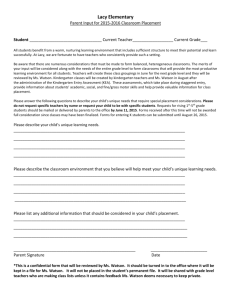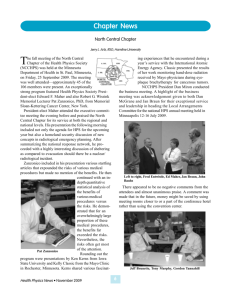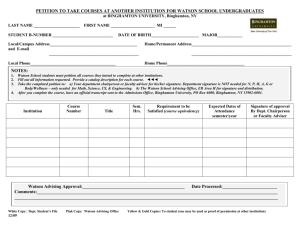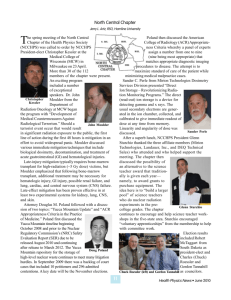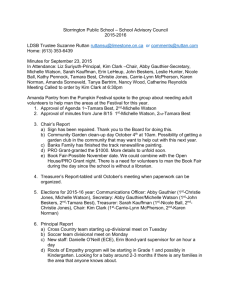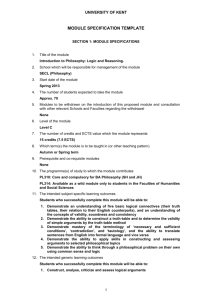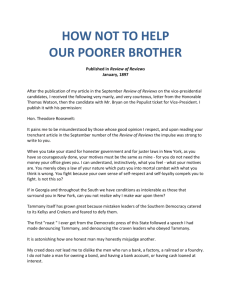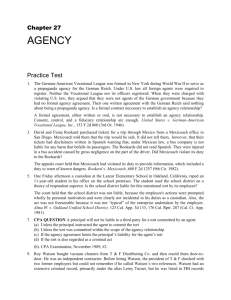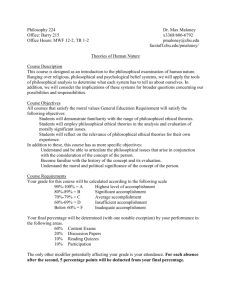Moral Psychology
advertisement
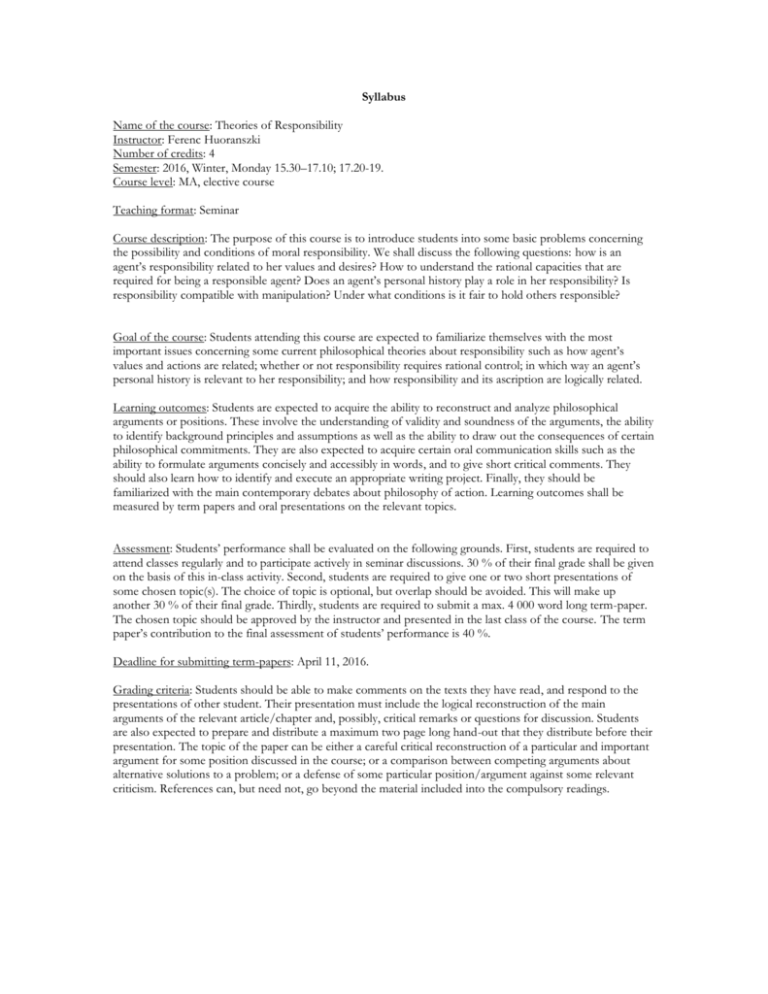
Syllabus Name of the course: Theories of Responsibility Instructor: Ferenc Huoranszki Number of credits: 4 Semester: 2016, Winter, Monday 15.30–17.10; 17.20-19. Course level: MA, elective course Teaching format: Seminar Course description: The purpose of this course is to introduce students into some basic problems concerning the possibility and conditions of moral responsibility. We shall discuss the following questions: how is an agent’s responsibility related to her values and desires? How to understand the rational capacities that are required for being a responsible agent? Does an agent’s personal history play a role in her responsibility? Is responsibility compatible with manipulation? Under what conditions is it fair to hold others responsible? Goal of the course: Students attending this course are expected to familiarize themselves with the most important issues concerning some current philosophical theories about responsibility such as how agent’s values and actions are related; whether or not responsibility requires rational control; in which way an agent’s personal history is relevant to her responsibility; and how responsibility and its ascription are logically related. Learning outcomes: Students are expected to acquire the ability to reconstruct and analyze philosophical arguments or positions. These involve the understanding of validity and soundness of the arguments, the ability to identify background principles and assumptions as well as the ability to draw out the consequences of certain philosophical commitments. They are also expected to acquire certain oral communication skills such as the ability to formulate arguments concisely and accessibly in words, and to give short critical comments. They should also learn how to identify and execute an appropriate writing project. Finally, they should be familiarized with the main contemporary debates about philosophy of action. Learning outcomes shall be measured by term papers and oral presentations on the relevant topics. Assessment: Students’ performance shall be evaluated on the following grounds. First, students are required to attend classes regularly and to participate actively in seminar discussions. 30 % of their final grade shall be given on the basis of this in-class activity. Second, students are required to give one or two short presentations of some chosen topic(s). The choice of topic is optional, but overlap should be avoided. This will make up another 30 % of their final grade. Thirdly, students are required to submit a max. 4 000 word long term-paper. The chosen topic should be approved by the instructor and presented in the last class of the course. The term paper’s contribution to the final assessment of students’ performance is 40 %. Deadline for submitting term-papers: April 11, 2016. Grading criteria: Students should be able to make comments on the texts they have read, and respond to the presentations of other student. Their presentation must include the logical reconstruction of the main arguments of the relevant article/chapter and, possibly, critical remarks or questions for discussion. Students are also expected to prepare and distribute a maximum two page long hand-out that they distribute before their presentation. The topic of the paper can be either a careful critical reconstruction of a particular and important argument for some position discussed in the course; or a comparison between competing arguments about alternative solutions to a problem; or a defense of some particular position/argument against some relevant criticism. References can, but need not, go beyond the material included into the compulsory readings. 2 Topics and readings: Week 1 Responsibility and higher order agency Week 2 Week 3 Responsibility and ‘volitional necessity’ Responsibility and reasons Week4 Week 5 Week 6 Week 7 Responsibility and control Responsibility and manipulation Abilities, ought and can Responsibility and norms Week 8 Week 9 Responsibility and weakness of the will Responsibility and emotions Week 10 Week 11 Week 12 Responsibility and responses Responsibility and abilities Responsibility without control H. G. Frankfurt ‘Freedom of the Will and the Concept of a Person’, ‘Three Concepts of Free Action’, in The Importance of What We Care About: Philosophical Essays. CUP (1988) 11-25, 47-57. G. Watson ‘Free Agency’, in Agency and Answerability: Selected Essays. OUP (2004) 13-32. H. G. Frankfurt ‘Necessity and Desire’; ‘Identification and Wholeheartedness’ in Frankfurt 1988, 104-103, 159-178. Watson, G. ‘Volitional Necessities’, in Watson, 2004, 88-122. S. Wolf ‘The Reason View’ in Freedom within Reason (OUP, 1990) 67–93. G. Watson ‘Two Faces of Responsibility’ in Watson 2004, 260288. M. Fischer – M. Ravizza Responsibility and Control: A Theory of Moral Responsibility (CUP, 1998) 63–91; D. Pereboom, ‘Determinism al Dente’, Nous 29 (1995) 21–45; A. R. Mele (2008). Manipulation, Compatibilism, and Moral Responsibility. Journal of Ethics 12 (3/4): 263 - 286. D. Nelkin Making Sense of Freedom and Responsibility. Oxford University Press, (2011) 64-84; 98-116. Pettit, P. – M. Smith ‘Freedom in Belief and Desires’, Journal of Philosophy 93, (1996) 429-449. M. Smith ‘A Theory of Freedom and Responsibility’ in G. Cullity and B. Gaut (eds.) Ethics and Practical Reason (Oxford: Clarendon Press, 1997) 293–319. G. Watson ‘Skepticism about the Weakness of the Will’, in Watson 2004, 33-58. M. Smith ‘Rational Capacities’, in Sarah Stroud & Christine Tappolet (eds.), Weakness of Will and Varieties of Practical Irrationality. OUP, 2003, 17-38. P. Strawson ‘Freedom and resentment’ in Freedom and Resentment and Other Essays. Routledge. (1974/2008), 1-25. G. Watson, ‘Responsibility and the Limits of Evil’ in Watson 2004, 219-259. Wallace, J. Responsibility and the Moral Sentiment, (Harvard UP, 1996) 51-95. Wallace, J. Responsibility and the Moral Sentiment, (Harvard UP, 1996) 154-193. R. M. Adams (1985). ‘Involuntary Sins’, Philosophical Review 94 (1): 3-31. G. Sher (2006). ‘Out of Control’, Ethics 116 (2):285-301.
